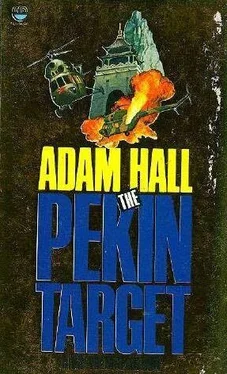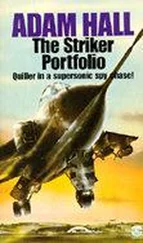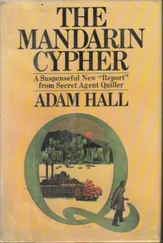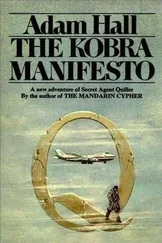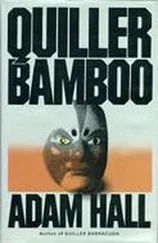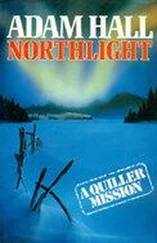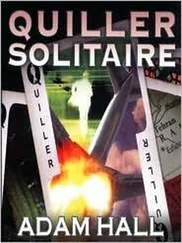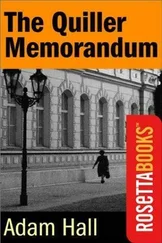Tung Kuo-feng.
A Chinese, Spur had said, scion of a family traceable to the early Ch'ing dynasty. Tung isn't a young man any more; I'd put him at sixty. But extremely fit; lots of ki, you know, the real thing. If those bastards in London are putting you solo into the field with Tung Kuo-feng, you don't stand a chance. Not a chance in hell.
A current of air met the tendril of smoke and twisted it into a spiral; from somewhere outside I could hear distant chanting, to the sound of wooden clappers; it must be sundown. The man in front of me didn't speak; perhaps he was silently joining in the prayers.
What would he pray for? He should pray for the souls of the departed; this man had killed Sinclair, the British Secretary of State, the American Ambassador, Jason, Spur, Soong Yongshen and his sister, Soong Li-fei, their necks bared under the sword. Let him pray for them. And for himself, if I had a chance to close in.
We sat facing each other in the low light of the lamp. My back burned from the bruising of the gun; my legs were still trembling from the strain of the five-hour march with the man on my back. I was close enough now to Tung Kuo-feng, and I could probably move with at least half my normal speed; but he would have had reports of me from his team of hit men, and would be wary; he wouldn't allow me this close to him without some kind of protection, and his hands, lying so peacefully on the folds of the black and gold silk, probably concealed a ninja weapon. Or was he counting on the fact that out there in the courtyard he had saved my life?
I wasn't ready for him yet, in any case. We want you to talk to him, Ferris had said.
The chanting and the clack of the wooden clappers died away, and a gong boomed; then there was quiet.
"Who are you?"
His voice was quiet, but the tone had an extraordinary harshness, sounding as if it weren't coming from a living body but from a recorder that was distorting it, giving it a metallic flatness.
"Colonel West, British Army, attached NATO defence force, Asian theatre."
The assumed rank of colonel came under routine instructions in the event of the executive's decision to use a military cover; it was the only one I had: you don't do a night drop with a black chute into the Korean mountains to look for geological specimens.
"You feel," he asked me, "that is the best you can do?"
"That's my true identity."
His English was correct and educated; when I'd been sprawled on the big grey flagstones out there a few hours ago, he'd spoken Chinese and an interpreter had put it straight into Russian; I'd understood only the Russian side, as Tung had repeated with unyielding authority that I was not to be killed until he had questioned me.
"What brought you to the mountains?"
"I was on a night exercise.
"With what objective?"
"Survival."
"I realise that your training as a secret agent requires you to explain as little as possible, but we must not waste time. I have to go through the formality of questioning you, since those were the terms of your reprieve; I must therefore know your cover story, so that I can prove later if necessary that I have indeed questioned you. Let me at this point make it clear that while I carry a certain degree of authority, the person in ultimate command here is Colonel Sinitsin of the KGB, whom you saw briefly, I think, when you arrived. In other respects I am, like yourself, a prisoner."
The Russian connection.
I still hadn't got things worked out. I hadn't been fully conscious when I'd arrived, and the incoming data had gone into the memory in its raw state for later analysis, if I lived. I had seen several Europeans looking down at me and at the body of the Korean, two of them in grey formal suits and polo-necked sweaters; it was one of these who had told the Koreans to put me against a wall and shoot me, speaking in Russian to an interpreter. Other men had been there: Koreans again, wearing track suits with the insignia of the Olympiad; behind them there'd been the terraced roofs of the monastery, part of it in ruins, and the roof of a temple nearby, and two large shapes under camouflage nets, one of them with a rotor poking out; above one of the roofs there had been an omnidirectional radio antenna.
I'd had time to do a rough analysis of all this data while I'd been recovering in the cell where they'd thrown me: originally, I suppose, a monk's personal quarters, a narrow cubicle with a grilled window and a crude wooden bed. The most obvious thing was that Tung Kuo-feng hadn't sought refuge here, as the blind priest had thought; he was here to conduct or participate in what looked like a minor military operation. There were always several track-suited guards in sight, and from watching them I'd become more and more convinced that they were at least para-military and professionally trained.
"Where are your papers?" Tung asked me tonelessly.
"I lost track of them when I came down. It was a bad landing."
"Your flying suit was also lost?"
"I took it off when the sun came up; it was too hot."
"And 'lost track of it'."
"That's right."
I sensed movement at the edge of my vision; there were two grilled apertures on one wall of the chamber, showing a lamplit arch beyond; I assumed someone was passing there, outside, or had stopped to watch us, and listen.
"No one else here," Tung said, "understands English." I felt suddenly chilled; he was reading my mind. "It is important for you to know that when you and I converse, even in the company of others, it is in secret. What other languages do you speak?"
"A bit of army French."
He fell silent, waiting for me to say more. I didn't. "You say you were on an exercise in survival. Who else was with you?"
"No one."
"You chose to be alone?"
"Yes. I was getting fed up sitting around with nothing to do. There's nothing here for a defence force to defend. So I asked permission to do a one-man survival course over the weekend. I've done it before, quite a few times, in England. Were you educated there? Your English is pretty good."
He said: "When will they begin searching for you?"
"They won't need to. I can use the radio here to tell them I'm okay." I left a slight pause, as he'd been doing, but he didn't ask what radio. "There'll be some trouble for those Koreans, though. That fellow was doing his damnedest to shoot me dead. I suppose you know that."
Two seconds, three. "I have told you we must not waste time. I know that you are an agent in the British Secret Service and that your assignment was to enquire into the death of your Secretary of State in Pekin. You have resisted efforts on the part of my own agents to eliminate you. You are here in the hope of eliminating me, since it is believed I was responsible for the two political assassinations in Pekin, and might be in the process of ordering others, as indeed I am. For your information, TWA Flight 232 from Pekin sustained an accident on take-off early this morning, killing more than fifty people including an American football team; they had been visiting the People's Republic of China on a goodwill mission with the aim of furthering the interests of international sport."
I think he wasn't quite finished, but I got up at that point and did a bit of walking about to ease the leg muscles. "Look, you ought not to be telling me things like that at this stage, before the trial. You've just made some pretty hefty confessions."
His small grey head was turning to watch me. "As you know, the Americans are as fanatical about sport as the English. The object of the sabotage action was to further incense the Americans and strain their new relations with China."
"All I can say is, I've given you fair warning."
It was like having two conversations going on, but we both knew what we were doing, and we both knew that we knew.
Читать дальше
